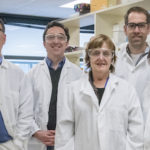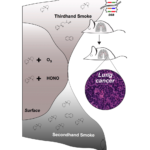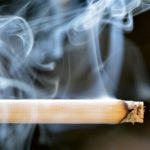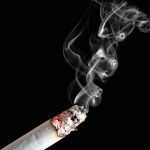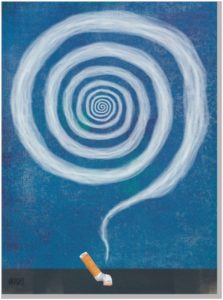 Berkeley Lab thirdhand smoke researchers have been awarded a new three-year grant totaling $904,744. The funding from the Tobacco-Related Disease Research Program (TRDRP) will support translational studies aimed at mitigating health impacts of exposure to thirdhand smoke (THS)—the toxic residues from tobacco smoke that linger on indoor surfaces and in dust long after a cigarette has been extinguished. From the Biosciences Area, Biological Systems and Engineering (BSE) Division staff scientist Bo Hang will serve as principal investigator on the studies, with senior scientist Jian-Hua Mao and staff scientist Antoine Snijders, also of BSE, as co-investigators. Collaborators on the project include staff scientist Hugo Destaillats and retiree affiliate Lara Gundel in the Energy Technologies Area (ETA) at Berkeley Lab, as well as researchers at California Consortium on Thirdhand Smoke partner institutions UC San Francisco and UC Riverside.
Berkeley Lab thirdhand smoke researchers have been awarded a new three-year grant totaling $904,744. The funding from the Tobacco-Related Disease Research Program (TRDRP) will support translational studies aimed at mitigating health impacts of exposure to thirdhand smoke (THS)—the toxic residues from tobacco smoke that linger on indoor surfaces and in dust long after a cigarette has been extinguished. From the Biosciences Area, Biological Systems and Engineering (BSE) Division staff scientist Bo Hang will serve as principal investigator on the studies, with senior scientist Jian-Hua Mao and staff scientist Antoine Snijders, also of BSE, as co-investigators. Collaborators on the project include staff scientist Hugo Destaillats and retiree affiliate Lara Gundel in the Energy Technologies Area (ETA) at Berkeley Lab, as well as researchers at California Consortium on Thirdhand Smoke partner institutions UC San Francisco and UC Riverside.
Thirdhand Smoke Found to Increase Lung Cancer Risk in Mice
Cigarette smoke contains myriad compounds that are known mutagens and carcinogens, and the health risks associated with active smoking and secondhand smoke are well established. Nearly 10 years ago, researchers at Berkeley Lab identified another potentially hazardous source of tobacco exposure: “thirdhand smoke,” the toxic residues that linger on indoor surfaces and in dust long after a cigarette has been extinguished. A team led by Antoine Snijders, Jian-Hua Mao, and Bo Hang in Biosciences’ Biological Systems and Engineering (BSE) Division have determined that early thirdhand smoke exposure is also associated with increased incidence and severity of lung cancer in mice.
Thirdhand Smoke Study Gets Renewed Media Attention
Research published earlier this year by Berkeley Lab scientists in Biological Systems and Engineering Division (BSE) showing that exposure to thirdhand smoke was associated with low body weight and immune changes in young mice has recently received a flurry of renewed media attention. Antoine Snijders was interviewed via Skype for a segment that aired on New York’s Fox 5 News. In it, he noted that human infants and toddlers could potentially be at risk of exposure. “They play with toys, they play on carpets, there’s much more hand-to-mouth action than most adults do. So the exposure levels could be significantly higher in that age group,” he said. An article on USAToday.com quoted Bo Hang and Jian-Hua Mao. “We suspected that the young are most vulnerable because of their immature immune systems, but we didn’t have a lot of hard evidence to show that before,” Hang said. The study was also referenced on the blog Bustle which linked to the original Berkeley Lab News Center article.
Dangers of Thirdhand Smoke Uncovered
An April 5 US News & World Report story on thirdhand smoke (THS), the toxic contamination that remains after the cigarette is extinguished, quoted Bo Hang, biochemist staff scientist in the Biological Systems & Engineering Division. Previous studies, led by Hang, have found that THS can damage DNA in human cells; subsequent animal studies by others have found that THS damages the liver and lungs, impedes the healing of wounds and can contribute to hyperactivity. Now, new research by Martins Green et al. published in PLOS ONE shows that, in mice, THS causes insulin resistance, a precursor to Type 2 diabetes. “This is a relatively new area,” says Hang, who continues to study the potential harmful effects of thirdhand smoke. Read the full story.
Berkeley Lab Signs CRADA with City of Nanjing
As part of the Cooperative Research & Development Agreement with the Nanjing High-Tech Zone (NHZ), the Lab’s Gary Karpen, Mina Bissell, Bo Hang, Jian-Hua Mao, and Weiguo Zhang will help discover targets for mitigation or cure to promote product development in cancer-related fields. They met with the Nanjing mayor last month.
Was this page useful?


